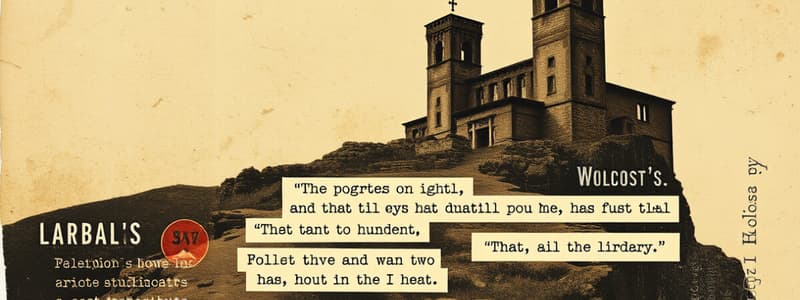Podcast
Questions and Answers
What does Cathy indicate by saying, 'I am Heathcliff'?
What does Cathy indicate by saying, 'I am Heathcliff'?
- She dislikes Heathcliff
- Heathcliff represents her instability (correct)
- She loves Edgar more
- She has a stable identity
What kind of choices should we expect from Catherine?
What kind of choices should we expect from Catherine?
Unpredictable and surprising choices
What describes a Byronic hero?
What describes a Byronic hero?
Contemptuous of conventional morality, unruly, melancholy, and haunted by secret guilt
What expectation can we have about Heathcliff's treatment of Isabella?
What expectation can we have about Heathcliff's treatment of Isabella?
Edgar Linton is compared to a doll beside Heathcliff.
Edgar Linton is compared to a doll beside Heathcliff.
What does the phrase 'imp of Satan' suggest about Heathcliff?
What does the phrase 'imp of Satan' suggest about Heathcliff?
Why does Cathy feel it would degrade her to marry Heathcliff?
Why does Cathy feel it would degrade her to marry Heathcliff?
What does Heathcliff vow in his quote, 'I won't rest til you are with me'?
What does Heathcliff vow in his quote, 'I won't rest til you are with me'?
What is the significance of the narrative being unreliable?
What is the significance of the narrative being unreliable?
What does Lockwood's statement about Mrs. Dean reveal?
What does Lockwood's statement about Mrs. Dean reveal?
How does Cathy describe the difference between Edgar and Heathcliff?
How does Cathy describe the difference between Edgar and Heathcliff?
How is Linton described?
How is Linton described?
What does Edgar suffer from when he sees Cathy vexed?
What does Edgar suffer from when he sees Cathy vexed?
Heathcliff treated Linton with kindness.
Heathcliff treated Linton with kindness.
What does Hareton's behavior with the puppies signify?
What does Hareton's behavior with the puppies signify?
What does Heathcliff crave when Cathy dies?
What does Heathcliff crave when Cathy dies?
When Earnshaw dies, it sounded wild and stormy, yet it was not ______.
When Earnshaw dies, it sounded wild and stormy, yet it was not ______.
How does Cathy describe her love for Linton?
How does Cathy describe her love for Linton?
What does Cathy plan to do to take revenge?
What does Cathy plan to do to take revenge?
What does Heathcliff mean by securing Hareton?
What does Heathcliff mean by securing Hareton?
What does Catherine feel about her image in the surroundings?
What does Catherine feel about her image in the surroundings?
What do open doors and lattices signify after Heathcliff's death?
What do open doors and lattices signify after Heathcliff's death?
What does Cathy compare her need to marry Edgar to?
What does Cathy compare her need to marry Edgar to?
What thematic role does Isabella Linton play?
What thematic role does Isabella Linton play?
What is the nature of the love between Catherine and Heathcliff?
What is the nature of the love between Catherine and Heathcliff?
What does John Hagen suggest about the nature of Catherine and Heathcliff's emotions?
What does John Hagen suggest about the nature of Catherine and Heathcliff's emotions?
Flashcards are hidden until you start studying
Study Notes
Key Quotes from Wuthering Heights
- "I am Heathcliff" signifies Cathy’s unstable identity, reflecting her deep and tumultuous connection with Heathcliff.
- Described as "mischievous and wayward," Catherine embodies unpredictability, capable of love yet destructive tendencies leading to her own demise.
- The Byronic hero is characterized by contempt for conventional morality, embodying the romantic archetype of melancholy and secret guilt.
- Heathcliff's portrayal as "a fierce, pitiless, wolfish man" suggests his inherent cruelty, particularly towards Isabella, emphasizing his wild nature.
- The comparison of Edgar to "a doll" reveals his fragility and effeminacy, positioning him as a contrast to Heathcliff's rawness.
- The terms "imp of Satan," "dark-skinned gypsy," and "bad omen" allude to Heathcliff's perceived malevolence and societal outsider status.
- Cathy's declaration, "It would degrade me to marry Heathcliff now," illustrates her internal conflict and social aspirations.
- Heathcliff's vow, "I won't rest til you are with me," depicts his obsessive love and determination to be reunited with Cathy.
- The narrative's unreliability is highlighted in "I only speak from hearsay: for I saw little," emphasizing the subjective nature of storytelling.
- Lockwood's remark, "Mrs Dean, I like you, but I don't like your double-dealing," indicates his awareness of Nelly’s biases in narrating the story.
- The vivid imagery in "Edgar is as different as a moonbeam from lightning, or frost from fire" illustrates the stark contrasts between Edgar and Heathcliff.
- Linton is depicted as "a pale delicate effeminate boy," conveying his fragility and weak disposition.
- Edgar's feelings are emphasized in "the stab of a knife could not inflict a worse pang than he suffered seeing his lady vexed," showcasing his deep care for Catherine.
- The quote regarding Heathcliff's treatment of Linton exhibits his cruelty, highlighting a theme of horror in the narrative.
- "Hanging a litter of puppies from a chair back" reflects Hareton's uncivilized behavior and poor treatment of animals.
- Heathcliff's desire for madness after Cathy’s death is encapsulated in his plea, "drive me mad," illustrating his grief.
- The line, "it sounded wild and stormy, yet it was not cold," uses pathetic fallacy to convey emotions surrounding Earnshaw’s death.
- Cathy’s passing is characterized by "never regained consciousness to miss Heathcliff or know Edgar," signifying her complex relationships.
- Cathy’s dramatic expression, "I gave him my heart, and he took it and pinched it to death and flung it back to me," shows her emotional torment.
- The metaphor, "my love for Linton is like the foliage in the woods," contrasts the transient nature of her affection for Edgar versus the enduring love for Heathcliff.
- Cathy's assertion, "I'll try to break their hearts, by breaking my own," illustrates her vengeful spirit in love.
- Heathcliff’s cruelty towards Hareton is shown in "I've got him faster than his scoundrel of a father secured me," highlighting a cycle of vengeance.
- "In every cloud, every tree...I am surrounded with her image" indicates Heathcliff's pervasive grief and connection to Cathy’s memory.
- The description, "both doors and lattices were open," symbolizes new beginnings following Heathcliff's death.
- Cathy’s contemplation of love in "I've no more business to marry Edgar Linton than I have to be in heaven" uses religious imagery to convey her dilemma.
- Emily Brontë's use of Isabella Linton symbolizes rebellion against Victorian women’s roles, limited by her selfishness and intelligence.
- John Hagen argues that the indestructible love between Catherine and Heathcliff is an inherent truth, akin to natural laws.
- The passionate yet destructive nature of Cathy and Heathcliff’s relationship, noted by John Hagen, leads to their loss of humanity.
Studying That Suits You
Use AI to generate personalized quizzes and flashcards to suit your learning preferences.




